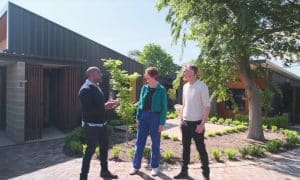The Australian Capital Territory (ACT) is emerging as a leader in solar energy, with over 70,000 homes expected to have solar panels installed by 2024. As more residents turn to solar panels in the ACT, households benefit from significantly reduced electricity bills and a lower carbon footprint. Interest in battery storage is also increasing, with approximately 15% of new installations now including battery systems. This enables ACT residents to maximise the potential of their solar panels, lessen their reliance on the grid, and contribute to a more sustainable future.
Businesses across the ACT are also leveraging solar panels to cut operational costs and achieve sustainability goals. The ACT government provides various incentives to support the adoption of solar energy, making it easier for residents to access affordable options. Energy Matters offers free solar quotes, helping individuals discover the best deals on solar panels in the ACT. With strong government support and a growing commitment to clean energy, investing in solar panels in the ACT is a smart, long-term decision for both homes and businesses.
Get Solar Quotes from up to 3 Local Installers in ACT
Step 1: Complete our simple quote form, and we’ll connect you with reliable local installers.
Step 2: You’ll receive contact from up to three local installers via phone or email, sharing additional details and their best offers.
Step 3: All quotes are free and come with no obligation, giving you the freedom to select the option that best suits your needs and budget.

Read more about solar panels and other renewable energy technology in Canberra.
On this page
Do solar panels make for a smart investment? How much can you save?
If you’re considering whether solar panels are a worthwhile investment for ACT residents, the answer is a resounding yes. In 2024, solar energy continues to be one of the smartest investments, with homeowners in the ACT saving an average of 25% on their energy bills compared to those relying solely on the grid. Solar installations are now more affordable and accessible than ever. Whether you’re in Canberra or surrounding regions, you can benefit from government subsidies and find the best solar deals available. Get your free solar quotes today at Energy Matters.
How much do solar panels cost in the ACT?
The cost of installing solar panels in the ACT varies depending on system size, installation complexity, and brand choice. As of October 2024, homeowners in the ACT can expect to pay around $4,480 for a 4kW system, $4,940 for a 5kW system, $5,490 for a 6kW system, $6,460 for a 7kW system, and $8,270 for a 10kW system. These prices include standard installation, the STC discount, and GST. Larger systems generally provide greater long-term savings, especially for households with higher energy consumption.
The chart below outlines the typical costs for various solar system sizes in the ACT, giving a clear understanding of current market rates.
Figures are accurate as of October 2024. Source: Solar Choice – October 2024 solar price index. Your solar system price will vary according to your location, installer, products, and any deals or discounts provided by your retailer. All prices are to be used as a guide.
“Energy Matters were very helpful throughout the process, from quote to installation they exceeded our expectations. Their team was very professional and informative, from start to end they answered all my questions. Happy with the outcome.”
Pennington
“I recently used the Energy matters solar quote service to help me decide which company to use to install my solar and battery. I was extremely happy with the outcome. I got 3 quotes within 24 hours, all 3 companies were very helpful and answered all my questions, I highly recommend using Energy Matter you won’t be disappointed.”
Peter
“Extremely prompt installers, very simple process from quotation to installation. The staff handled the installation procedure with great professionalism, was very knowledgeable, and had no trouble answering any of my technical queries. I hardly ever leave reviews, but I made an exception for this business – thanks for the recommendation Energy Matters.”
Houle
ACT solar panels: An investment with great returns
For a larger 10kW system, annual savings can reach $2,000 to $2,700, especially for homes with higher self-consumption or those on time-of-use tariffs. Both system sizes provide significant savings, making solar energy a wise investment for households across the ACT.
ACT rebates and incentives
ACT residents and businesses can benefit from several state and federal incentives and rebates, including:
- Small-scale Technology Certificates (for residential and small to medium businesses)
- Feed-in Tariffs
- Sustainable Household Scheme
Discover more about these programs and initiatives through the button below.
Energy efficient products and upgrades
Upgrade your outdated appliances and products to the latest energy-efficient technology. Your hot water system, heating and cooling units, and other household devices may be costing you thousands each year. By replacing them, you can save significantly while reducing your environmental impact.
In the ACT, a solar hot water system can save households between $250 and $800 annually on energy bills, depending on hot water usage and system type. These systems harness solar energy to heat water, decreasing reliance on electricity or gas, making them a cost-effective and eco-friendly choice.
ACT residents can benefit from various incentives, including the Sustainable Household Scheme, for upgrading to energy-efficient products.
ACT solar batteries: The future of renewable energy
In the ACT, 15% of all new solar systems installed in 2024 included battery storage. By adding a battery to your solar setup, you can enjoy power savings around the clock. Not only do solar panels and batteries enhance your home’s value, but they also lower your energy bills and increase your energy independence from the grid.
Batteries are often seen as the future of energy, allowing you to store solar power generated during the day for use at night or on cloudy days when sunlight is limited. In fact, incorporating a battery with a residential solar system can potentially double your self-consumption of generated electricity.
Maximise your battery’s potential by joining a Virtual Power Plant (VPP). This initiative can shorten the payback period for your battery investment and provide additional income by selling your stored energy back to the grid during peak demand periods. To learn more about the Origin Loop VPP, visit our page.
The Electric Vehicle (EV) revolution is gaining strength in Australia. Are you EV ready?
Did you know that approximately 50% of Australians are considering purchasing an electric vehicle (EV) within the next five years? In the ACT, installing a home battery not only provides the flexibility to charge your EV overnight but also allows you to sell any excess stored electricity back to the grid. This means you can choose the best option for your needs, depending on your lifestyle and the prevailing feed-in tariff.
With residential EV charging, you can turn your home into a personal charging station, significantly reducing your vehicle costs and increasing your convenience. The growing EV market in the ACT, where EVs accounted for 4.1% of all vehicle sales in 2022, reflects a positive shift towards sustainable transport options.
Now is a great time to explore how solar and battery solutions can enhance your energy independence and support the transition to electric vehicles.
Making solar simple
We understand that concerns about potential hassles can be a significant barrier to going solar. At Energy Matters, our partners are committed to creating customised solutions that meet your specific needs and support you throughout the entire process. No matter where you are in the ACT, you can easily request up to three quotes from reliable local installers who are ready to discuss your requirements and address any questions you have about transitioning to solar energy.
Explore your options today and take the first step towards a more sustainable future!
ACT solar and battery FAQs
Solar panels can significantly reduce your energy bills, increase your home’s value, and lower your carbon footprint. They also allow you to take advantage of government incentives and feed-in tariffs.
In the ACT, adding battery storage can increase your self-consumption of solar energy, potentially saving you between $250 and $800 annually on your energy bills, depending on your usage.
Residents in the ACT can benefit from the Sustainable Household Scheme and Small-scale Technology Certificates (STCs) that provide financial assistance for upgrading to solar energy systems.
The installation process typically takes one to three days, depending on the size of the system and any site-specific requirements.
The size of the solar system you need depends on your energy consumption, available roof space, and budget. An installer can help assess your requirements and recommend an appropriate system size. Use our handy solar + battery calculator and request FREE quotes today!
Yes, you can use solar power to charge your EV. Installing a solar panel system with battery storage allows you to charge your vehicle during the day and use stored energy at night, reducing your charging costs.
If you produce more energy than you consume, the excess electricity can be sold back to the grid through the ACT feed-in tariff, providing you with additional income. If you have battery storage, your excess solar can be stored for use at night, on cloudy days, or during blackout events.
Yes, investing in solar panels and batteries can provide substantial long-term savings on your energy bills, increase your home’s value, and support your energy independence. With rising energy prices, many homeowners in the ACT find solar to be a smart financial decision.
ACT news and updates
Keep up to date with the latest renewable news and updates from the Australian Capital Territory.












































